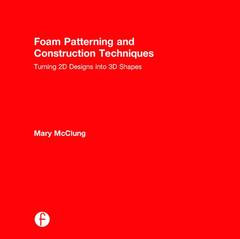Description
Foam Patterning and Construction Techniques
Turning 2D Designs into 3D Shapes
Author: McClung Mary
Language: English
Keywords
Polyether Urethane; positive; Nice Level; Foam Patterning; pieces; Single Edged Razor Blades; Seam Allowances; Cold Foam; Positive Sculpt; Reticulated Foam; Polyether Foam; mouth; Closed Cell Foam; plate; Dremel Tool; X-acto Knife; Upholstery Foam; Sponged; Black Sharpie; Pattern Pieces; Foam Pieces; Mouth Plate; Foam Object; Urethane Foam; Rigid Foam; Flexible Foam; Eye Ridges; Draping Process; Custom Wig
Publication date: 04-2016
· 22.9x22.9 cm · Hardback
Publication date: 04-2016
· 22.9x22.9 cm · Paperback
Description
/li>Contents
/li>Readership
/li>Biography
/li>
Foam Patterning and Construction Techniques: Turning 2D Designs into 3D Shapes explains how to create your theatrical prop, puppet, or costume design using the unique and tricky medium of foam. Step-by-step instructions, photographs, and explanations illustrate how to translate your design from paper to reality by creating custom "skin" patterns, followed by creation of a foam mockup. The book details how to bring your project to life with varied finishing techniques, including using fur and fabric coverings and dying and painting foam. Numerous supplies, tools, and safety procedures and protocols are also covered.
Table of Contents
Acknowledgements
Preface
_____________________________________________________
Section 1: The Medium of Foam: Materials, Tools and Safety
Chapter 1: Materials
Chapter 2: Safety
Chapter 3: What Type of Foam to Use?
___________________________________________________
Section 2: Design
Chapter 4: An Approach to Design
Chapter 5: Renderings, Working Drawings and Simplicity of Form
_____________________________________________________
Section 3: Translating Design into Reality: Techniques used in the
Patterning Process
Chapter 6: Additive Patterning: Adding a Surface layer.
Chapter 7: Subtractive Patterning: Cutting away the Surface Layer.
Chapter 8: Speed Patterning
Chapter 9: Free Form Foam Patterning
_____________________________________________________
Section 4: Determining the Pattern Divisions, "Truing" Patterns and Changing Scale
Chapter 10: Determining the Pattern Divisions
Chapter 11: Transferring Patterns to Paper and "Truing" Pattern Pieces
Chapter 12: Scale: Determining the Size of the Finished Piece
Chapter 13: Formula for Reducing and Enlarging
Chapter 14: How to Enlarge and Reduce Pattern Pieces
_____________________________________________________
Section 5: Putting It All Together: From Pattern to Object
Chapter 15: How to Bevel Corners and Utilize Darts
Chapter 16: Cutting Pattern Pieces out of Foam
Chapter 17: Gluing and Sewing
Section 6: Finishing the Design
Chapter 18: Fur and Fabric Coverings
Chapter 19: Uncovered Foam: How To Finish
Chapter 20: Detailing and Bringing To Life
________________________________________________________________________
Section 7: This Section Goes Through The Full Process For 6 Projects
Chapter 21: Free Form Reticulated Foam Construction
Chapter 22: Making Two Different Shapes from the Same Foam Pattern
Chapter 23: Patterned Foam Mask
Chapter 24: Patterned Foam Armor
Chapter 25: Patterned and Carved Raptor
Appendices
A. Sources and Supplies
B. Bibliography
Mary McClung has designed costumes, puppets, masks, and sets for theatre, video, and television for over 17 years. As Artistic Director and craftsperson at Animax Designs, she had the opportunity to design and build for companies such as Disney, Children’s Television Workshop, and Universal Studios. McClung has also designed productions with The Dallas Children’s Theatre, The Idaho Repertory Theatre, and The Colorado Shakespeare Festival. She teaches full time at West Virginia University as Professor of Costume Design.




